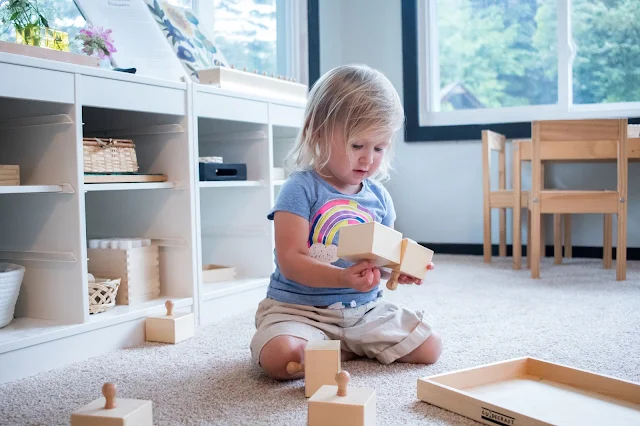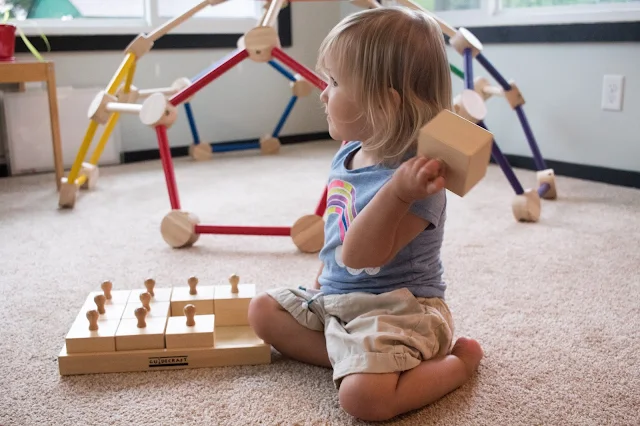Children have a deep need to develop their senses as they explore the world around them. It is through this development that they prepare themselves for the deeper learning that comes with many academic subjects. Unfortunately, many mainstream educational methods ignore the need for sensorial development and they skip right to traditional academic subjects like language and math. But, by doing so, children are often under-prepared to tackle these other topics.
You may notice this need for sensorial exploration start to creep in between 2.5-years-old and 3, although children are developing their senses from birth. I know that I have with Nora. It started with examining heavy objects. But, moved to questions like "what's that noise?" with far away or quiet sounds. Lately, it's been a lot of, "I smell something! What I smell?"
In these instances, it would be great to recreate a Montessori classroom at home for Nora to explore all the different sensorial materials. There are so many to help children isolate and refine their sensorial skills, but it's often unnecessary to do so. These traditional materials can be expensive and extensive. Also, for children who will attend children's house -- like Nora will this fall -- it's not necessary to repeat work at home that they will have at school.
This post contains affiliate links at no cost to you.
But, that doesn't mean there isn't anything you can do at home! There are a lot of ways to support sensorial learning at home at 3-years-old! Here's a list of some of the traditional sensorial work that a 3-year-old may use and some alternative activities to consider trying if you are noticing a need for sensory play, or sensorial exploration, to meet these needs!
- DIY sound cylinders -- we used Easter eggs to make ours when Henry was homeschooling
- Sound Boxes {similar} -- like Nora is using in these pictures
- Sound games -- hide with a small bell and see if your toddler can find you!
- Nature walk -- listen and talk about sounds you hear
- Sorting objects by size
- Pincer/Pinching work
- Puzzles that focus on size changes
- Sort common objects by size -- rocks for example
- Stack nesting blocks
- Give children language as you talk about size -- small, smaller, smallest, large, larger, largest -- part of these work is just acquiring this new descriptive language
- Puzzles that focus on length
- Bake and cook together -- stop to enjoy the way things smell
- Grow herbs or flowers indoors and talk about how they smell
- Nature walk -- stop to smell flowers, herbs, and other plants
- Explore spices in your home, can even match small containers by smelling only
- Play smelling game with some kid-safe essential oils and cotton balls -- trying to find matches
- DIY a version with sandpaper
- Nature walk -- collect natural materials that appeal to your child then sort by rough or smooth
- Sort common objects by the way they feel
- Give your child the rough and smooth language when talk about experiences in your home
- Make lemonade together -- taste ingredients individually and talk about differences
- Bake and cook together tasting spices as you go
- Eat new and different foods
- DIY your own version with common fabrics in your home
- Nature walk match different "materials" found in nature
- Introduce 3D puzzles
- 3D building with cube builders
This list is by no means exhaustive or complete! Nor is it meant to be a list of things that could replace traditional Montessori sensorial materials. These are things that can be done to compliment traditional materials at home!
Have you noticed the need to refine senses in your child? How have you supported it?
12 Months of Montessori
This post is brought to you as part of the 12 Months of Montessori series. This month's theme is sensorial. Don't miss these other Montessori and Montessori-inspired sensorial themed posts!
Montessori Sensorial Materials Every Child Will Love | Natural Beach Living
Montessori Sensorial Album: Geometric Solids {Printable 3-Part Cards} | The Natural Homeschool
Seashell Color Matching {Easy-to-Prepare Variation of Montessori Color Box 3}| Living Montessori Now
DIY Montessori Tasting Bottles and Free Printables | Mama’s Happy Hive
Sensorial Learning at Home at 3-years-old | The Kavanaugh Report
Montessori Geometric Solids as Sensorial Material | The Pinay Homeschooler
Fun And Easy DIY Montessori Mystery bags With Free Printables | Uno Zwei Tutu
Montessori Baric Tablets | Welcome to Mommyhood







